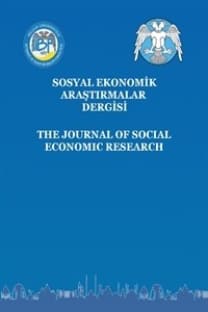FİNANSAL İSTİKRARSIZLIK VE DIŞ BORÇ: TÜRKİYE ÖRNEĞİ
Bu makale finansal istikrarsızlık teorisinin dış borç problemine uygulamasını ele almaktadır. Çalışmada ilk olarak kapitalizmin istikrarsızlık teorilerine değinilmiş daha sonra finansal istikrarsızlık teorisi ve arkasındaki mantık ortaya çıkarılmaya çalışılmıştır. Son bölümde Türkiye ekonomisinde dış borcun gerçekten istikrarsızlandırıcı bir unsur olup olmadığını göstermek için Türkiye ile ilgili veriler ve ekonometrik analizler sunulmuştur. Ekonometrik analiz sonuçlarına göre yüksek borç stokunun Türkiye’de enflasyona neden olduğu söylenebilir. Yürütülen tahmin istatistiksel olarak anlamlı olmadığı için yüksek dış borç stokunun Türkiye’de büyümeyi yavaşlattığını söylemek mümkün değildir.
Anahtar Kelimeler:
Finansal istikrarsızlık, dış borç, Türkiye
This paper deals with the application of the financial instability theory to the problem of external debt. Firstly, it surveys different thought on the theories of instability of capitalism. Later, it presents the theories of instability and their logic behind. Next, it links vicious cycles of external debt problems to the financial instability process. Last section presents econometric analysis and data on Turkey in order to show that external debt is in fact a financially instabilizing factor in the Turkish economy. According to econometric analysis, the high level of external debt can be surely said to lead inflationary process in Turkey. On the other hand, it is not possible to say that the high level of external debt stock leads to growth slowdown in Turkey because the estimation carried out is not statistically significant.
Keywords:
Financail instability, foreign debt, Turkey,
- ISSN: 2148-3043
- Yayın Aralığı: Yılda 2 Sayı
- Başlangıç: 2000
- Yayıncı: Selçuk Üniversitesi
Sayıdaki Diğer Makaleler
EKONOMİK ÖZGÜRLÜKLER VE DOĞRUDAN YABANCI YATIRIMLAR: İSTATİSTİKSEL BİR ANALİZ
DÜNYA TİCARET ÖRGÜTÜ’NÜN SON DÖNEMLERDEKİ UYGULAMALARININ TÜRKİYE’YE ETKİLERİ
FİNANSAL İSTİKRARSIZLIK VE DIŞ BORÇ: TÜRKİYE ÖRNEĞİ
İNSANİ KALKINMA ENDEKSİ VE TÜRKİYE İÇİN DEĞERLENDİRİLMESİ
Şevket TÜYLÜOĞLU, Burak KARALI
SOSYAL SINIFLARDA TÜKETİMİN SINIF BELİRLEYİCİLİK ROLÜ
